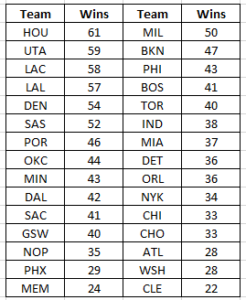These are my initial thoughts the day after the 2020 election. You’ll notice most of them are about my understanding of what is going on, rather than what I wish happened and how it compares to those wishes. My wishes for an election aren’t remotely within the realm of possibility and I don’t treat them as such. I generally treat elections as data points to calibrate my understanding of the world around me.
After the 2016 election, I believed that Trump beat Clinton because Clinton was an especially unpopular candidate. I no longer believe that. In the popular vote, Trump kept his margin about the same and improved in percentage. Based on the 2020 results, I believe Trump’s appeal is more popular than I have realized.
Most striking is how far off the results appear from the polls. I think there are two explanations (both could be true): A significant segment of Trump voters lie to pollsters; pollsters have a hard time reaching all segments of Trump voters. A recent Gallup poll found 56% of registered voters said they are better off now than they were four years ago. This was hard to square with poor poll numbers for Trump. There are a few percentage points of people who support the job Trump is doing but won’t admit to voting for him.
The polling gap troubles me. I do not believe the claim that polls are presented as propaganda to make leftist positions and politicians seem artificially popular. There are certainly pollsters who do this. On the whole, pollsters were so embarrassed by 2016 they sought to remedy their errors. Clearly, this is still a problem. If we can’t get roughly accurate responses on how the country weighs in on politicians and policies, I think we are in for trouble. In a country of over 300 million citizens, no individual can get an accurate read on public opinion through personal experience. If we can’t count of polls to give us better guidance, we’re fumbling in the dark.
Looking at crosstabs, you have to notice Trump’s improvement with minorities. According to the New York Times, Trump did 11.5 points better in majority Hispanic districts in FL, GA, and NC compared to 2016. This wasn’t a total shock to me, I expected Trump to improve with Hispanics about 10 points, but this goes against the common narrative. I think we need to be cautious with saying this definitively right now. Exit polls are extra messy this year due to heavy early voting. There will be months and years of debating why this shift occurred. I don’t have a particular narrative myself, but I’m not sure how to square the anti-BLM protests narrative with a Biden win in Minnesota.
If you are curious, I did not vote for Trump, Biden, or Jo Jorgensen. In fact I did not vote for a single person on my ballot. I did vote, yes on proposal 1 and no on proposal 2. I voted for Gary Johnson in 2016 and I felt I could honestly tell people I voted for the candidate who I thought would make the best President. I was not sure I could say that about Jorgensen. Aside from my policy disagreements with him, I fear Trump’s abuses of power and disregard for the constitution. Aside from my policy disagreements with him, I fear Biden will not be held accountable for any of his abuses of power as shown by the media’s refusal to cover Hunter Biden’s business dealings in China. Ultimately, the one outcome I feared was one party holding the Presidency, House and Senate. I don’t think we will see that.
I placed two bets on PredictIt and one prediction on Twitter. In March I bet Trump would win the Presidency and back in September 2019 I bet the House would be Democratic but the Senate would be Republican. A few days ago I posted these predictions about how the Presidential race would play out. As I write this early Wednesday evening, this looks largely correct with a few mistakes, some of which may be contested in the days to come.
Trump has announced he will request a recount in Wisconsin. I predict he will do the same in Michigan and Pennsylvania. I would not be surprised to see lawsuits in these states as well. There has been a lot of talk about voter fraud today, particularly from Republicans. This is not surprising. Early voting was heavily Democratic, day-of voting was heavily Republican. This meant that while some states reported early voting first and some reported day-of first, most critical states had some kind of significant shift. My take on voter fraud is if you are an election observer and you tell me there is fraud, I will listen to you. If you’re a random person on Twitter reporting anything other than evidence from an election observer, I am likely to ignore you. There are many people with huge incentives to identify and fight any voter fraud against their interests. I will sit back and see what major cases are brought before the courts. And for the record, unless you are an election observer, I don’t think you can saw you definitively know there was no fraud in that locality. Blind dismissals of the notion of fraud is just as lazy as blind allegations that a heavily-Democratic big city must be hiding fraudulent votes.
I think Democrats may regret not only fighting for expanded mail voting but promoting it. Republicans have been criticized for not taking action in legislatures they control to allow quick counting, as is the place in Florida. I don’t know enough about this area to confidently agree but this seems plausible to me. When Trump tweets out statements like this, I can’t disagree with the notion that Republicans seek to sow doubt on as many mail votes as they can. Even if there is no voter fraud, because of the strong partisan split in early vs day-of voting, you were going to see strong shifts of this manner.
If Trump loses, I think he will be the Republican nominee in 2024. He outperformed everyone’s expectations even if he loses the Presidency. As a party Republicans did better than expected even in the House. I think there will be a strong belief that Trump has electoral magic no other Republican can match, and any concerns about his 2020 performance will be chalked up to covid-19 being a wild card out of his control.

